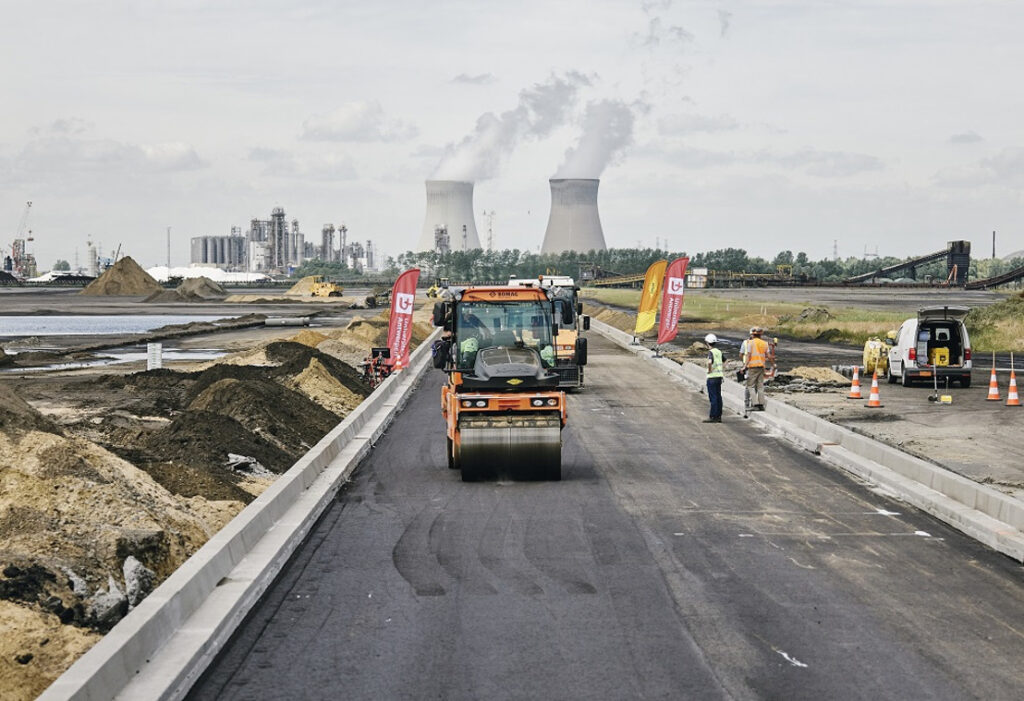
Port of Antwerp and the University of Antwerp develop asphalt of the future
ANTWERP : Port of Antwerp and the University of Antwerp have developed new types of asphalt that extend the working life of roads subjected to heavy traffic. In order to test these sustainable asphalts, 5 test sections will be laid this week on the Nieuwe Westweg on the right bank of the Scheldt. The test sections are part of a larger study to develop sustainable road infrastructure for a port environment. The objective is to have all new roads in the port covered with the new asphalts.

In short:
- Port of Antwerp and the University of Antwerp develop new types of asphalt
- Asphalt is laid on 5 test sections of 75 metres
- Sensors measure the deformation of the asphalt
- Objective is a sustainable road infrastructure in the port area
Extension of the working life
Port of Antwerp manages around 200 km of roads in the port area. As these roads are subjected to heavy traffic on a daily basis, they require a lot of maintenance. To extend the working life of these roads, Port of Antwerp and the University of Antwerp have developed new types of asphalt that can withstand the unique circumstances in a port environment. The asphalt, which has been designed and tested in the lab, contains reinforcing components to increase its durability. The asphalt will be tested this week, and will be laid on 5 test sections (of 75 metres each) on the Nieuwe Westweg on the right bank of the Scheldt. After being evaluated, all new roads in the port will then be covered with the sustainable asphalt.
Asphalt of the future
Besides asphalt, other innovative materials and techniques are also being tested in the test sections. For example, a foundation with so-called “lean asphalt” will be applied for the first time to see whether it is suitable for a port environment. The study is the result of a collaboration with the University of Antwerp which started in 2017. In 2019, innovative sensors were already installed in the road structure in other test sections, to measure the warping of asphalt on a road with heavy traffic. Thanks to the project, these sensors have now been optimised so that the added value of the new sustainable asphalt can be effectively measured. The data from the tests should lead to the development of a fully sustainable and strong road infrastructure.
Wim Van den bergh, Senior Lecturer in Asphalt Technology, University of Antwerp: “The unique and heavy loads in a port environment make the port of Antwerp the ideal testing ground for innovative road infrastructure. This study will help us to develop the asphalt of the future and make the right decisions in terms of recycling and circularity. Indeed, the working life of a road plays a crucial role in this regard.”
Johan Braspenninckx, Technical Manager, Port of Antwerp: “ We are investigating different types of asphalt, especially developed for the needs in a port environment. Our experience is that classic mixtures lose some of their strength after only a few years due to ageing and the extreme conditions in the port. This collaboration with the University of Antwerp and the investment in this study will allow us to live up to our pioneering role in the field of innovation. We are building a sustainable port, and developing a sustainable road infrastructure is an important part of this. We also want to set the standard for other ports.”
Annick De Ridder, port alderwoman: “With this asphalt of the future, we are ensuring that the port’s road infrastructure will obtain a sustainable label. Port of Antwerp is playing a pioneering role in this regard, by opening up the port as a testing ground for technological innovations. We are proud that we can implement such projects with partners like the University of Antwerp.”
Source : Port of Antwerp

